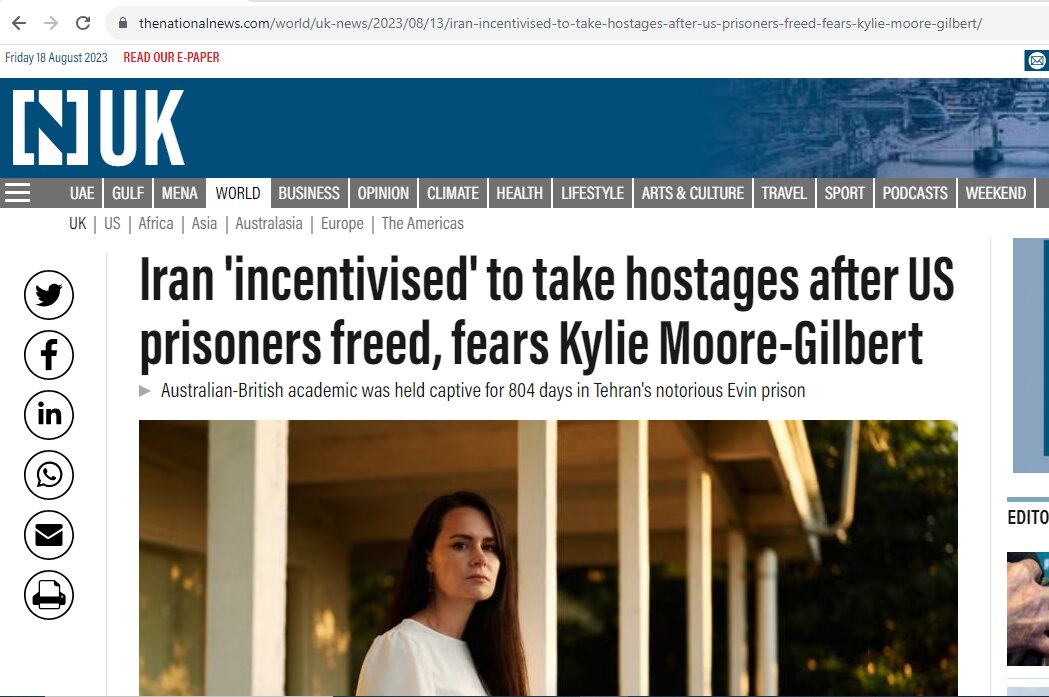Academic or spy? That’s the question!

TEHRAN – In an article published on thenationalnews.com on August 13, Tariq Tahir quoted Kylie Moore Gilbert who had said "Iran incentivized to take hostages after U.S. prisoners freed”.
Gilbert, who is referred to as an academic with Australian and British citizenship, was jailed in Iran for 804 days on espionage charges.
According to Gilbert, the release of four American prisoners in Iran was tied to the release of $6 billion of Iran's frozen assets in South Korea. This could incentivize Tehran to take more hostages, Gilbert claimed.
Gilbert dubbed the U.S.-Iran interaction as "hostage diplomacy" and said this strategy must be actively and resolutely curtailed to prevent what she called “further ransom” payments to Iran.
In response to Gilbert’s claims, who is known in Iran as a Mossad spy, it is necessary to mention a few points:
It was not the Islamic Republic that proposed exchanging prisoners to free its financial resources. The Americans have suggested this as an alternative to the failed JCPOA, leaving room for diplomacy and dialogue. If the United States reaches a dead end in its interaction with Iran, it will have to answer to the world about its next steps. Since war is not an option, a prisoner exchange can maintain diplomatic relations and satisfy both sides.
Every year, over three million foreigners travel to Iran to enjoy its nature, see tourist attractions, and socialize with Iranians. They return home with great memories and without any problems. The question is: Why are only a handful of foreign travelers like Mrs. Gilbert caught? The answer could untangle many thoughts.
It is widely accepted that Iran opposes imperialism more than any other political system in the world. The Islamic Republic, threatened by the spy services of the United States, Israel, England, and some U.S. allies, has stood alone for 45 years against the tyranny and bullying of great powers. To ensure the safety and security of its citizens and interests, Iran must be vigilant in dealing with hostile governments' anti-security measures, and prevent them from infiltrating; it is not surprising to arrest trained enemy forces who enter Iran disguised as academics, environmental activists, or other roles who gather sensitive information and images.
Who is Ms. Kylie Moore Gilbert?
The Mehr news agency introduces Gilbert in the following way: Based on the evidence, Gilbert's father is Jewish. She was introduced to the Herzliya Center, which serves multiple purposes in Israel, by Britain's MI6. She finished the military training program at the Gadna Barracks of the Zionist regime, from 2011 to 2012; she pursued her Hebrew studies at the University of Haifa.
In 2015-2016, the Australian-British citizen received a mission notification for Iran in a meeting with her leading officer in Bahrain, and in 2017 she entered Iran under the pretext of scientific research titled "Iran's relationship with Bahraini Shiites after the Arab Spring".
Under the guise of a tourist, Gilbert took pictures of the religious sites of Qom and the city of Rey to make her presence in Iran seem normal, and during this time, she tried to get close to the Bahraini activists.
Some media outlets said that one of Moore Gilbert's missions was to gather intel on groups near the Syrian resistance front and obtain military and economic information about Iran and the resistance front.
In the end, the audience may wonder if Mrs. Gilbert, who has a black record, can provide an unbiased opinion considering the aforementioned points. Does the Islamic Republic not have the right to defend its sovereignty, infrastructure, and the interests of its people against the enemy’s spies? Do you still think that the Islamic Republic has adopted hostage diplomacy? It seems that a country like Iran, with adequate deterrent power, superior diplomacy, strong logic, exemplary resistance, and national pride, does not need to rely on false methods.
